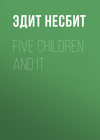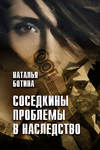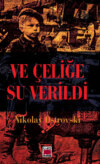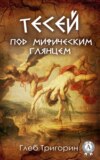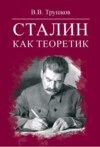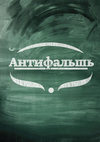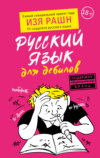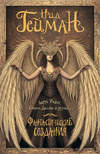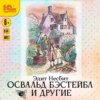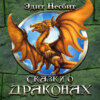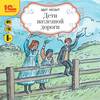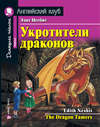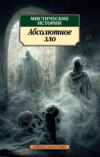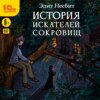Читать книгу: «Five Children and It»
TO
JOHN BLAND
My Lamb, you are so very small,
You have not learned to read at all;
Yet never a printed book withstands
The urgence of your dimpled hands.
So, though this book is for yourself,
Let mother keep it on the shelf
Till you can read. O days that pass,
That day will come too soon, alas!
NOTE
Parts of this story have appeared in the Strand Magazine under the title of "THE PSAMMEAD."
CHAPTER I
BEAUTIFUL AS THE DAY
The house was three miles from the station, but, before the dusty hired hack had rattled along for five minutes, the children began to put their heads out of the carriage window and say, "Aren't we nearly there?" And every time they passed a house, which was not very often, they all said, "Oh, is this it?" But it never was, till they reached the very top of the hill, just past the chalk-quarry and before you come to the gravel-pit. And then there was a white house with a green garden and an orchard beyond, and mother said, "Here we are!"
"How white the house is," said Robert.
"And look at the roses," said Anthea.
"And the plums," said Jane.
"It is rather decent," Cyril admitted.
The Baby said, "Wanty go walky;" and the hack stopped with a last rattle and jolt.
Everyone got its legs kicked or its feet trodden on in the scramble to get out of the carriage that very minute, but no one seemed to mind. Mother, curiously enough, was in no hurry to get out; and even when she had come down slowly and by the step, and with no jump at all, she seemed to wish to see the boxes carried in, and even to pay the driver, instead of joining in that first glorious rush round the garden and orchard and the thorny, thistly, briery, brambly wilderness beyond the broken gate and the dry fountain at the side of the house. But the children were wiser, for once. It was not really a pretty house at all; it was quite ordinary, and mother thought it was rather inconvenient, and was quite annoyed at there being no shelves, to speak of, and hardly a cupboard in the place. Father used to say that the iron-work on the roof and coping was like an architect's nightmare. But the house was deep in the country, with no other house in sight, and the children had been in London for two years, without so much as once going to the seaside even for a day by an excursion train, and so the White House seemed to them a sort of Fairy Palace set down in an Earthly Paradise. For London is like prison for children, especially if their relations are not rich.
Of course there are the shops and theatres, and entertainments and things, but if your people are rather poor you don't get taken to the theatres, and you can't buy things out of the shops; and London has none of those nice things that children may play with without hurting the things or themselves—such as trees and sand and woods and waters. And nearly everything in London is the wrong sort of shape—all straight lines and flat streets, instead of being all sorts of odd shapes, like things are in the country. Trees are all different, as you know, and I am sure some tiresome person must have told you that there are no two blades of grass exactly alike. But in streets, where the blades of grass don't grow, everything is like everything else. This is why many children who live in the towns are so extremely naughty. They do not know what is the matter with them, and no more do their fathers and mothers, aunts, uncles, cousins, tutors, governesses, and nurses; but I know. And so do you, now. Children in the country are naughty sometimes, too, but that is for quite different reasons.
The children had explored the gardens and the outhouses thoroughly before they were caught and cleaned for tea, and they saw quite well that they were certain to be happy at the White House. They thought so from the first moment, but when they found the back of the house covered with jasmine, all in white flower, and smelling like a bottle of the most expensive perfume that is ever given for a birthday present; and when they had seen the lawn, all green and smooth, and quite different from the brown grass in the gardens at Camden Town; and when they found the stable with a loft over it and some old hay still left, they were almost certain; and when Robert had found the broken swing and tumbled out of it and got a bump on his head the size of an egg, and Cyril had nipped his finger in the door of a hutch that seemed made to keep rabbits in, if you ever had any, they had no longer any doubts whatever.
The best part of it all was that there were no rules about not going to places and not doing things. In London almost everything is labelled "You mustn't touch," and though the label is invisible it's just as bad, because you know it's there, or if you don't you very soon get told.
The White House was on the edge of a hill, with a wood behind it—and the chalk-quarry on one side and the gravel-pit on the other. Down at the bottom of the hill was a level plain, with queer-shaped white buildings where people burnt lime, and a big red brewery and other houses; and when the big chimneys were smoking and the sun was setting, the valley looked as if it was filled with golden mist, and the limekilns and hop-drying houses glimmered and glittered till they were like an enchanted city out of the Arabian Nights.
Now that I have begun to tell you about the place, I feel that I could go on and make this into a most interesting story about all the ordinary things that the children did,—just the kind of things you do yourself, you know, and you would believe every word of it; and when I told about the children's being tiresome, as you are sometimes, your aunts would perhaps write in the margin of the story with a pencil, "How true!" or "How like life!" and you would see it and would very likely be annoyed. So I will only tell you the really astonishing things that happened, and you may leave the book about quite safely, for no aunts and uncles either are likely to write "How true!" on the edge of the story. Grown-up people find it very difficult to believe really wonderful things, unless they have what they call proof. But children will believe almost anything, and grown-ups know this. That is why they tell you that the earth is round like an orange, when you can see perfectly well that it is flat and lumpy; and why they say that the earth goes round the sun, when you can see for yourself any day that the sun gets up in the morning and goes to bed at night like a good sun as it is, and the earth knows its place, and lies as still as a mouse. Yet I daresay you believe all that about the earth and the sun, and if so you will find it quite easy to believe that before Anthea and Cyril and the others had been a week in the country they had found a fairy. At least they called it that, because that was what it called itself; and of course it knew best, but it was not at all like any fairy you ever saw or heard of or read about.
It was at the gravel-pits. Father had to go away suddenly on business, and mother had gone away to stay with Granny, who was not very well. They both went in a great hurry, and when they were gone the house seemed dreadfully quiet and empty, and the children wandered from one room to another and looked at the bits of paper and string on the floors left over from the packing, and not yet cleared up, and wished they had something to do. It was Cyril who said—
"I say, let's take our spades and dig in the gravel-pits. We can pretend it's seaside."
"Father says it was once," Anthea said; "he says there are shells there thousands of years old."
So they went. Of course they had been to the edge of the gravel-pit and looked over, but they had not gone down into it for fear father should say they mustn't play there, and it was the same with the chalk-quarry. The gravel-pit is not really dangerous if you don't try to climb down the edges, but go the slow safe way round by the road, as if you were a cart.
Each of the children carried its own spade, and took it in turns to carry the Lamb. He was the baby, and they called him that because "Baa" was the first thing he ever said. They called Anthea "Panther," which seems silly when you read it, but when you say it it sounds a little like her name.
The gravel-pit is very large and wide, with grass growing round the edges at the top, and dry stringy wildflowers, purple and yellow. It is like a giant's washbowl. And there are mounds of gravel, and holes in the sides of the bowl where gravel has been taken out, and high up in the steep sides there are the little holes that are the little front doors of the little bank-martins' little houses.
The children built a castle, of course, but castle-building is rather poor fun when you have no hope of the swishing tide ever coming in to fill up the moat and wash away the drawbridge, and, at the happy last, to wet everybody up to the waist at least.
Cyril wanted to dig out a cave to play smugglers in, but the others thought it might bury them alive, so it ended in all spades going to work to dig a hole through the castle to Australia. These children, you see, believed that the world was round, and that on the other side the little Australian boys and girls were really walking wrong way up, like flies on the ceiling, with their heads hanging down into the air.
The children dug and they dug and they dug, and their hands got sandy and hot and red, and their faces got damp and shiny. The Lamb had tried to eat the sand, and had cried so hard when he found that it was not, as he had supposed, brown sugar, that he was now tired out, and was lying asleep in a warm fat bunch in the middle of the half-finished castle. This left his brothers and sisters free to work really hard, and the hole that was to come out in Australia soon grew so deep that Jane, who was called Pussy for short, begged the others to stop.
"Suppose the bottom of the hole gave way suddenly," said she, "and you tumbled out among the little Australians, all the sand would get in their eyes."
"Yes," said Robert; "and they would hate us, and throw stones at us, and not let us see the kangaroos, or opossums, or bluegums, or Emu Brand birds, or anything."
Cyril and Anthea knew that Australia was not quite so near as all that, but they agreed to stop using the spades and to go on with their hands. This was quite easy, because the sand at the bottom of the hole was very soft and fine and dry, like sea-sand. And there were little shells in it.
"Fancy it having been wet sea here once, all sloppy and shiny," said Jane, "with fishes and conger-eels and coral and mermaids."
"And masts of ships and wrecked Spanish treasure. I wish we could find a gold doubloon, or something," Cyril said.
"How did the sea get carried away?" Robert asked.
"Not in a pail, silly," said his brother.
"Father says the earth got too hot underneath, as you do in bed sometimes, so it just hunched up its shoulders, and the sea had to slip off, like the blankets do us, and the shoulder was left sticking out, and turned into dry land. Let's go and look for shells; I think that little cave looks likely, and I see something sticking out there like a bit of wrecked ship's anchor, and it's beastly hot in the Australian hole."
The others agreed, but Anthea went on digging. She always liked to finish a thing when she had once begun it. She felt it would be a disgrace to leave that hole without getting through to Australia.
The cave was disappointing, because there were no shells, and the wrecked ship's anchor turned out to be only the broken end of a pick-axe handle, and the cave party were just making up their minds that sand makes you thirstier when it is not by the seaside, and someone had suggested that they all go home for lemonade, when Anthea suddenly screamed—
"Cyril! Come here! Oh, come quick—It's alive! It'll get away! Quick!"
They all hurried back.
"It's a rat, I shouldn't wonder," said Robert. "Father says they infest old places—and this must be pretty old if the sea was here thousands of years ago"—
"Perhaps it is a snake," said Jane, shuddering.
"Let's look," said Cyril, jumping into the hole. "I'm not afraid of snakes. I like them. If it is a snake I'll tame it, and it will follow me everywhere, and I'll let it sleep round my neck at night."
"No, you won't," said Robert firmly. He shared Cyril's bedroom. "But you may if it's a rat."
"Oh, don't be silly!" said Anthea; "it's not a rat, it's much bigger. And it's not a snake. It's got feet; I saw them; and fur! No—not the spade. You'll hurt it! Dig with your hands."
"And let it hurt me instead! That's so likely, isn't it?" said Cyril, seizing a spade.
"Oh, don't!" said Anthea. "Squirrel, don't. I—it sounds silly, but it said something. It really and truly did"—
"What?"
"It said, 'You let me alone.'"
But Cyril merely observed that his sister must have gone off her head, and he and Robert dug with spades while Anthea sat on the edge of the hole, jumping up and down with hotness and anxiety. They dug carefully, and presently everyone could see that there really was something moving in the bottom of the Australian hole.
Then Anthea cried out, "I'm not afraid. Let me dig," and fell on her knees and began to scratch like a dog does when he has suddenly remembered where it was that he buried his bone.
"Oh, I felt fur," she cried, half laughing and half crying. "I did indeed! I did!" when suddenly a dry husky voice in the sand made them all jump back, and their hearts jumped nearly as fast as they did.
"Let me alone," it said. And now everyone heard the voice and looked at the others to see if they had heard it too.
"But we want to see you," said Robert bravely.
"I wish you'd come out," said Anthea, also taking courage.
"Oh, well—if that's your wish," the voice said, and the sand stirred and spun and scattered, and something brown and furry and fat came rolling out into the hole, and the sand fell off it, and it sat there yawning and rubbing the ends of its eyes with its hands.
"I believe I must have dropped asleep," it said, stretching itself.
The children stood round the hole in a ring, looking at the creature they had found. It was worth looking at. Its eyes were on long horns like a snail's eyes, and it could move them in and out like telescopes; it had ears like a bat's ears, and its tubby body was shaped like a spider's and covered with thick soft fur; its legs and arms were furry too, and it had hands and feet like a monkey's.
"What on earth is it?" Jane said. "Shall we take it home?"
The thing turned its long eyes to look at her, and said—
"Does she always talk nonsense, or is it only the rubbish on her head that makes her silly?"
It looked scornfully at Jane's hat as it spoke.
"She doesn't mean to be silly," Anthea said gently; "we none of us do, whatever you may think! Don't be frightened; we don't want to hurt you, you know."
"Hurt me!" it said. "Me frightened? Upon my word! Why, you talk as if I were nobody in particular." All its fur stood out like a cat's when it is going to fight.
"Well," said Anthea, still kindly, "perhaps if we knew who you are in particular we could think of something to say that wouldn't make you angry. Everything we've said so far seems to have done so. Who are you? And don't get angry! Because really we don't know."
"You don't know?" it said. "Well, I knew the world had changed—but—well, really—Do you mean to tell me seriously you don't know a Psammead when you see one?"
"A Sammyadd? That's Greek to me."
"So it is to everyone," said the creature sharply. "Well, in plain English, then, a Sand-fairy. Don't you know a Sand-fairy when you see one?"
It looked so grieved and hurt that Jane hastened to say, "Of course I see you are, now. It's quite plain now one comes to look at you."
"You came to look at me, several sentences ago," it said crossly, beginning to curl up again in the sand.
"Oh—don't go away again! Do talk some more," Robert cried. "I didn't know you were a Sand-fairy, but I knew directly I saw you that you were much the wonderfullest thing I'd ever seen."
The Sand-fairy seemed a shade less disagreeable after this.
"It isn't talking I mind," it said, "as long as you're reasonably civil. But I'm not going to make polite conversation for you. If you talk nicely to me, perhaps I'll answer you, and perhaps I won't. Now say something."
Of course no one could think of anything to say, but at last Robert thought of "How long have you lived here?" and he said it at once.
"Oh, ages—several thousand years," replied the Psammead.
"Tell us about it. Do."
"It's all in books."
"You aren't!" Jane said. "Oh, tell us everything you can about yourself! We don't know anything about you, and you are so nice."
The Sand-fairy smoothed his long rat-like whiskers and smiled between them.
"Do please tell!" said the children all together.
It is wonderful how quickly you get used to things, even the most astonishing. Five minutes before, the children had had no more idea than you had that there was such a thing as a Sand-fairy in the world, and now they were talking to it as though they had known it all their lives.
It drew its eyes in and said—
"How very sunny it is—quite like old times! Where do you get your Megatheriums from now?"
"What?" said the children all at once. It is very difficult always to remember that "what" is not polite, especially in moments of surprise or agitation.
"Are Pterodactyls plentiful now?" the Sand-fairy went on.
The children were unable to reply.
"What do you have for breakfast?" the Fairy said impatiently, "and who gives it to you?"
"Eggs and bacon, and bread and milk, and porridge and things. Mother gives it to us. What are Mega-what's-its-names and Ptero-what-do-you-call-thems? And does anyone have them for breakfast?"
"Why, almost everyone had Pterodactyl for breakfast in my time! Pterodactyls were something like crocodiles and something like birds—I believe they were very good grilled. You see, it was like this: of course there were heaps of Sand-fairies then, and in the morning early you went out and hunted for them, and when you'd found one it gave you your wish. People used to send their little boys down to the seashore in the morning before breakfast to get the day's wishes, and very often the eldest boy in the family would be told to wish for a Megatherium, ready jointed for cooking. It was as big as an elephant, you see, so there was a good deal of meat on it. And if they wanted fish, the Ichthyosaurus was asked for,—he was twenty to forty feet long, so there was plenty of him. And for poultry there was the Plesiosaurus; there were nice pickings on that too. Then the other children could wish for other things. But when people had dinner-parties it was nearly always Megatheriums; and Ichthyosaurus, because his fins were a great delicacy and his tail made soup."
"There must have been heaps and heaps of cold meat left over," said Anthea, who meant to be a good housekeeper some day.
"Oh no," said the Psammead, "that would never have done. Why, of course at sunset what was left over turned into stone. You find the stone bones of the Megatherium and things all over the place even now, they tell me."
"Who tell you?" asked Cyril; but the Sand-fairy frowned and began to dig very fast with its furry hands.
"Oh, don't go!" they all cried; "tell us more about when it was Megatheriums for breakfast! Was the world like this then?"
It stopped digging.
"Not a bit," it said; "it was nearly all sand where I lived, and coal grew on trees, and the periwinkles were as big as tea-trays—you find them now; they're turned into stone. We Sand-fairies used to live on the seashore, and the children used to come with their little flint-spades and flint-pails and make castles for us to live in. That's thousands of years ago, but I hear that children still build castles on the sand. It's difficult to break yourself of a habit."
"But why did you stop living in the castles?" asked Robert.
"It's a sad story," said the Psammead gloomily. "It was because they would build moats to the castles, and the nasty wet bubbling sea used to come in, and of course as soon as a Sand-fairy got wet it caught cold, and generally died. And so there got to be fewer and fewer, and, whenever you found a fairy and had a wish, you used to wish for a Megatherium, and eat twice as much as you wanted, because it might be weeks before you got another wish."
"And did you get wet?" Robert inquired.
The Sand-fairy shuddered. "Only once," it said; "the end of the twelfth hair of my top left whisker—I feel the place still in damp weather. It was only once, but it was quite enough for me. I went away as soon as the sun had dried my poor dear whisker. I scurried away to the back of the beach, and dug myself a house deep in warm dry sand, and there I've been ever since. And the sea changed its lodgings afterwards. And now I'm not going to tell you another thing."
"Just one more, please," said the children. "Can you give wishes now?"
"Of course," said it; "didn't I give you yours a few minutes ago? You said, 'I wish you'd come out,' and I did."
"Oh, please, mayn't we have another?"
"Yes, but be quick about it. I'm tired of you."
I daresay you have often thought what you would do if you had three wishes given you, and have despised the old man and his wife in the black-pudding story, and felt certain that if you had the chance you could think of three really useful wishes without a moment's hesitation. These children had often talked this matter over, but, now the chance had suddenly come to them, they could not make up their minds.
"Quick," said the Sand-fairy crossly. No one could think of anything, only Anthea did manage to remember a private wish of her own and Jane's which they had never told the boys. She knew the boys would not care about it—but still it was better than nothing.
"I wish we were all as beautiful as the day," she said in a great hurry.
The children looked at each other, but each could see that the others were not any better-looking than usual. The Psammead pushed out his long eyes, and seemed to be holding its breath and swelling itself out till it was twice as fat and furry as before. Suddenly it let its breath go in a long sigh.
"I'm really afraid I can't manage it," it said apologetically; "I must be out of practice."
The children were horribly disappointed.
"Oh, do try again!" they said.
"Well," said the Sand-fairy, "the fact is, I was keeping back a little strength to give the rest of you your wishes with. If you'll be contented with one wish a day among the lot of you I daresay I can screw myself up to it. Do you agree to that?"
"Yes, oh yes!" said Jane and Anthea. The boys nodded. They did not believe the Sand-fairy could do it. You can always make girls believe things much easier than you can boys.
It stretched out its eyes farther than ever, and swelled and swelled and swelled.
"I do hope it won't hurt itself," said Anthea.
"Or crack its skin," Robert said anxiously.
Everyone was very much relieved when the Sand-fairy, after getting so big that it almost filled up the hole in the sand, suddenly let out its breath and went back to its proper size.
"That's all right," it said, panting heavily. "It'll come easier to-morrow."
"Did it hurt much?" said Anthea.
"Only my poor whisker, thank you," said he, "but you're a kind and thoughtful child. Good day."
It scratched suddenly and fiercely with its hands and feet, and disappeared in the sand.
Then the children looked at each other, and each child suddenly found itself alone with three perfect strangers, all radiantly beautiful.
They stood for some moments in silence. Each thought that its brothers and sisters had wandered off, and that these strange children had stolen up unnoticed while it was watching the swelling form of the Sand-fairy. Anthea spoke first—
"Excuse me," she said very politely to Jane, who now had enormous blue eyes and a cloud of russet hair, "but have you seen two little boys and a little girl anywhere about?"
"I was just going to ask you that," said Jane. And then Cyril cried—
"Why, it's you! I know the hole in your pinafore! You are Jane, aren't you? And you're the Panther; I can see your dirty handkerchief that you forgot to change after you'd cut your thumb! The wish has come off, after all. I say, am I as handsome as you are?"
"If you're Cyril, I liked you much better as you were before," said Anthea decidedly. "You look like the picture of the young chorister, with your golden hair; you'll die young, I shouldn't wonder. And if that's Robert, he's like an Italian organ-grinder. His hair's all black."
"You two girls are like Christmas cards, then—that's all—silly Christmas cards," said Robert angrily. "And Jane's hair is simply carrots."
It was indeed of that Venetian tint so much admired by artists.
"Well, it's no use finding fault with each other," said Anthea; "let's get the Lamb and lug it home to dinner. The servants will admire us most awfully, you'll see."
Baby was just waking up when they got to him, and not one of the children but was relieved to find that he at least was not as beautiful as the day, but just the same as usual.
"I suppose he's too young to have wishes naturally," said Jane. "We shall have to mention him specially next time."
Anthea ran forward and held out her arms.
"Come, then," she said.
The Baby looked at her disapprovingly, and put a sandy pink thumb in his mouth. Anthea was his favourite sister.
"Come, then," she said.
"G'way 'long!" said the Baby.
"Come to own Pussy," said Jane.
"Wants my Panty," said the Lamb dismally, and his lip trembled.
"Here, come on, Veteran," said Robert, "come and have a yidey on Yobby's back."
"Yah, narky narky boy," howled the Baby, giving way altogether. Then the children knew the worst. The Baby did not know them!
They looked at each other in despair, and it was terrible to each, in this dire emergency, to meet only the beautiful eyes of perfect strangers, instead of the merry, friendly, commonplace, twinkling, jolly little eyes of its own brothers and sisters.
"This is most truly awful," said Cyril when he had tried to lift up the Lamb, and the Lamb had scratched like a cat and bellowed like a bull! "We've got to make friends with him! I can't carry him home screaming like that. Fancy having to make friends with our own baby!—it's too silly."
That, however, was exactly what they had to do. It took over an hour, and the task was not rendered any easier by the fact that the Lamb was by this time as hungry as a lion and as thirsty as a desert.
At last he consented to allow these strangers to carry him home by turns, but as he refused to hold on to such new acquaintances he was a dead weight, and most exhausting.
"Thank goodness, we're home!" said Jane, staggering through the iron gate to where Martha, the nursemaid, stood at the front door shading her eyes with her hand and looking out anxiously. "Here! Do take Baby!"
Martha snatched the Baby from her arms.
"Thanks be, he's safe back," she said. "Where are the others, and whoever to goodness gracious are all of you?"
"We're us, of course," said Robert.
"And who's Us, when you're at home?" asked Martha scornfully.
"I tell you it's us, only we're beautiful as the day," said Cyril. "I'm Cyril, and these are the others, and we're jolly hungry. Let us in, and don't be a silly idiot."
Martha merely dratted Cyril's impudence and tried to shut the door in his face.
"I know we look different, but I'm Anthea, and we're so tired, and it's long past dinner-time."
"Then go home to your dinners, whoever you are; and if our children put you up to this play-acting you can tell them from me they'll catch it, so they know what to expect!" With that she did bang the door. Cyril rang the bell violently. No answer. Presently cook put her head out of a bedroom window and said—
"If you don't take yourselves off, and that precious sharp, I'll go and fetch the police." And she slammed down the window.
"It's no good," said Anthea. "Oh, do, do come away before we get sent to prison!"
The boys said it was nonsense, and the law of England couldn't put you in prison for just being as beautiful as the day, but all the same they followed the others out into the lane.
"We shall be our proper selves after sunset, I suppose," said Jane.
"I don't know," Cyril said sadly; "it mayn't be like that now—things have changed a good deal since Megatherium times."
"Oh," cried Anthea suddenly, "perhaps we shall turn into stone at sunset, like the Megatheriums did, so that there mayn't be any of us left over for the next day."
She began to cry, so did Jane. Even the boys turned pale. No one had the heart to say anything.
It was a horrible afternoon. There was no house near where the children could beg a crust of bread or even a glass of water. They were afraid to go to the village, because they had seen Martha go down there with a basket, and there was a local constable. True, they were all as beautiful as the day, but that is a poor comfort when you are as hungry as a hunter and as thirsty as a sponge.
Three times they tried in vain to get the servants in the White House to let them in and listen to their tale. And then Robert went alone, hoping to be able to climb in at one of the back windows and so open the door to the others. But all the windows were out of reach, and Martha emptied a toilet-jug of cold water over him from a top window, and said—
"Go along with you, you nasty little Eye-talian monkey."
It came at last to their sitting down in a row under the hedge, with their feet in a dry ditch, waiting for sunset, and wondering whether, when the sun did set, they would turn into stone, or only into their own old natural selves; and each of them still felt lonely and among strangers, and tried not to look at the others, for, though their voices were their own, their faces were so radiantly beautiful as to be quite irritating to look at.
"I don't believe we shall turn to stone," said Robert, breaking a long miserable silence, "because the Sand-fairy said he'd give us another wish to-morrow, and he couldn't if we were stone, could he?"
Покупайте книги и получайте бонусы в Литрес, Читай-городе и Буквоеде.
Участвовать в бонусной программе
